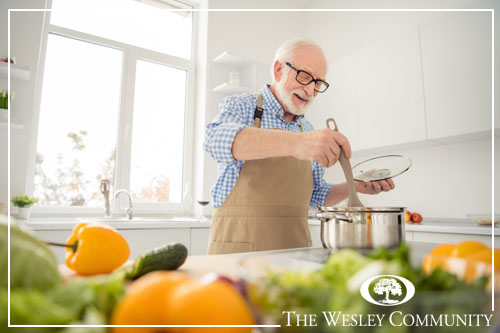The kitchen can be a room with many safety hazards. Learn how to protect a senior loved one with these tips.

For many people, the kitchen is the heart of the home. It is not only where we bake and cook, it’s also often where we read, manage finances, answer emails, and putter with craft projects. Unfortunately, the kitchen can also harbor a variety of safety hazards, especially for older adults.
To help prevent accidents, from falls to fires, here are a few safety tips to share with the seniors in your life, compliments of the experienced team at The Wesley Community.
Kitchen Fire Safety Checklist for Older Adults and Caregivers
Begin by carefully assessing the kitchen for potential fire hazards, such as:
- Flammable items: Dish towels hanging on oven handles or on the wall above the stovetop can brush against a lit burner and ignite. The same is true of curtains hung on windows near the stove. Be certain they are hemmed to a length that prevents them from falling on the burners. Remind your senior loved one to be careful where they place potholders, as well as plastic containers, while cooking.
- Clothing choices: Having a quick discussion about what clothing to wear when cooking can also lower the risk for a fire. For example, long, flowing sleeves on a shirt may accidentally brush against a burner or oven coil and catch fire. A safer choice is a short-sleeved shirt or a shirt with sleeves that can be rolled up.
- Cleanliness of vents: Many people aren’t aware that a dirty kitchen ventilation system is a common source of kitchen fires. If your aging parent or family member can’t remember when theirs was last cleaned, it’s likely time for a good scrubbing.
It’s also important to have safety devices in place in case of an accident, including:
- Smoke detector: While a smoke detector might not be necessary in the kitchen, there should be one located near it. Install one that alerts if either flames or smoke are detected.
- Fire extinguisher: Store an easy-to-operate fire extinguisher in the kitchen and review the operating instructions with your senior loved one.
- Cooking alert: It’s too easy to walk away and forget something is cooking on the stovetop or in the oven. We’ve all done it at one time or another. If a senior has memory loss, this might be a common occurrence and could have deadly consequences. Installing a device like CookStop might be worth considering.
Preventing a Senior from Experiencing a Fall in the Kitchen
Slipping or falling in the kitchen can lead to serious injuries for seniors. A few ways to lower their risk for either one include:
- Skid-resistant footwear: Tile flooring commonly used in kitchens can present a fall risk. Encourage your senior loved one to wear skid-free slippers or shoes in the kitchen. Place a non-skid mat or rug in front of the sink to soak up spills. That will help prevent water from pooling on the floor and creating a fall hazard.
- Thoughtful storage: To minimize the number of times an older adult has to use a stepladder in the kitchen, arrange food and supplies in a thoughtful manner. Store the most commonly used items in easy-to-reach locations, and those used less often in higher cupboards.
- Motion lights: Everyone makes an occasional run to the kitchen during the middle of the night for a snack or glass of water. Lower the risk of an older family member falling in the dark by installing motion-sensitive night-lights along their path.
Safe Living Environment for Seniors
Transitioning to a senior living community is another step that can create a safer environment for an older loved one. It’s just one of many benefits. You can read more in Understanding the True Value of Assisted Living.
To learn more about The Wesley Community, please call (518) 587-3600!

